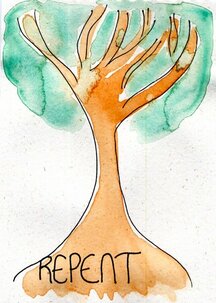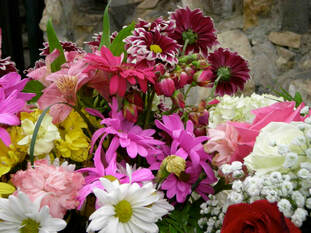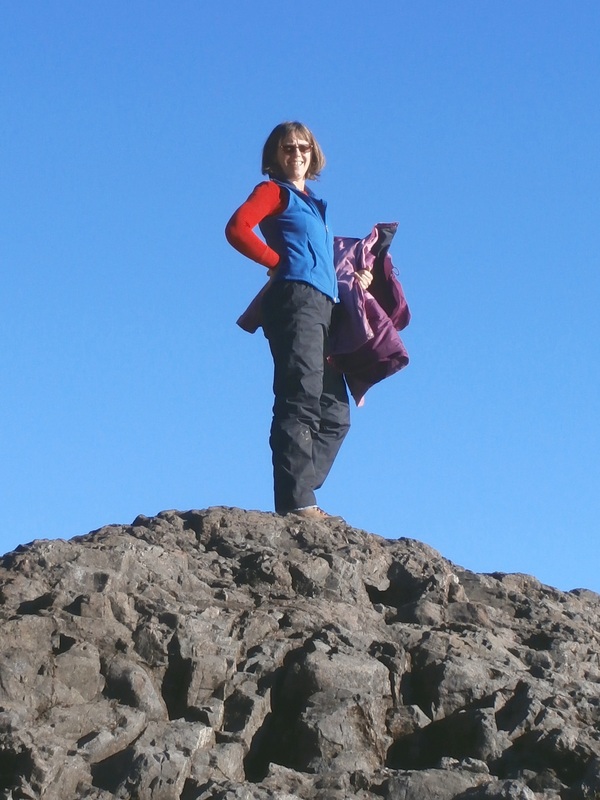|
A meditation based on Luke 13:1-9 I imagine myself among the crowd of thousands surrounding Jesus, peppering him with questions, trying to determine if he’s cut out to be our leader. Half a dozen of my friends and I are fuming over the massacre in the Temple. Some pilgrims from Galilee were worshipping, offering their sacrifices, when Pilate sent in his soldiers and slaughtered them. It was horrible, the sort of thing that makes headlines, and we want to know what Jesus is going to do about it. A friend elbows me, so I shout out: “Hey, Jesus, what about those Galileans?” Not really expecting an answer. But he turns my direction: “Cathy, Do you really believe that misfortune comes to only the wicked? Do you really believe that you can guarantee your own safety? That by following all the rules and pointing a finger at every infraction, and by believing we only get what we deserve, that you’ll avoid trouble, that disaster will never strike you? Well guess again. The Galileans Pilate murdered in the Temple were no worse sinners than you. Taking up the cause of blame, hatred, retaliation, and plotting the overthrow of the government after their death will do you no good, and I will have no part of it. Likewise, walls tumble down, and the innocent are crushed. Earthquakes strike without warning. Workmen are shoddy. Towers collapse, and you might well be standing in one when it does. You cannot escape the perils of life by hiding out at home, or cowering in fear. From where you stand, life appears arbitrary and capricious, and absolutely nothing you can do will save you. You will suffer and one day, you will surely die. But that does not mean you’re doomed.” Well, that shut me up. How well Jesus understands my inclinations toward cowardice and blame, my reflexive reaction to pin the responsibility for my circumstances and actions squarely on others—not only in these extreme events which seem out of my control, but in my own relationships as well. Assigning responsibility to the government or the weather or the full moon or my disagreeable neighbor seems easier than having no explanation at all; and it’s certainly easier than scrutinizing my own thoughts and actions for complicity. “Repent or perish,” Jesus says. “Repent or perish.” What does it mean to repent? It’s not simply about feeling guilty or offering an I’m sorry. Matthew Skinner, Professor of New Testament at Luther Seminary in Saint Paul, writes that repentance “is, at its root, about thinking and perception. It refers to a wholesale change in how a person understands something. It implies an utter reconfiguration of your perspective on reality and meaning, including (in the New Testament) a reorientation of yourself toward God. Your behavior might change as a result of this new perception, certainly; but repentance first involves seeing things differently and coming to a new understanding of what God makes possible.” In my own life, repentance began in 1985 when I was twenty-four. I was attending a training weekend for the anti-nuclear group Beyond War, with the goal of saving the world from nuclear annihilation. Raised in a religious and spiritual vacuum, I did not believe in God or religion. I believed in what I could see and touch, in science and empirical evidence, and the facts of the nuclear threat paralyzed me as I studied the Cold War learning that the promise of “mutually assured destruction” was all that kept the super powers in check. I dreamed almost nightly of bombings, mushroom clouds and radiation sickness, of moving through decimated cities. I understood that saving the world was up to me, and knowing that, I knew we were doomed. I hadn’t been able to keep my parents from divorcing when I was growing up. How could I keep the US from launching ICBMs at the Soviets? In preparation for the weekend training, I read all of Beyond War’s literature, and learned to draw their timeline: one that showed the rate of evolution speeding up drastically once our ancestors crawled from the sea, so that all we had to do was will ourselves to evolve. It was that simple. And quick. If enough of us said, “No more,” then war and violence would disappear like our prehensile tails. That weekend in the mountains, with the timeline looming before me, I stepped from my cabin into towering redwoods. Their interlaced roots spread wide into bracken fern, neon banana slugs slid across fragrant duff, and a chorus of frogs and crickets filled the air. Here was an ecosystem in perfect harmony, beyond my ability to completely comprehend and my capacity to save. In that moment, I knew I stood inside a miracle. The forest ecology hadn’t happened randomly as I understood evolution, or because the trees had willed it as I understood the Beyond War manifesto. It was the first moment I felt God revealed—the creative presence in and behind all that exists. My repentance toward faith began then: a slow process of abandoning my fear outrage, unbelief and demand for certainty in questions great (how to prevent nuclear war) and small (when to start a family), and opening myself to the possibility of mystery, learning to trust in what I couldn’t prove. I began to attend a United Methodist church where believers cared about the environment and social issues along with personal salvation. In the Bible and in church I heard, and continue to hear, stories of hope in the midst of violence, of change that happens not because of righteous indignation and demands, but through love, and faith, and accepting life as it painfully is. Along this spiritual journey, despite continual cries for outrage and fear coming from society, my own righteous indignation and fears about the state of the world have gradually ebbed. I have a part to play, yes, but as I learn that the limits of my power revolve around my own thoughts and actions, I surrender my ego, and come to embrace the existence of a far greater power always working for good in the world, whether I see it or not. For me this reorientation of the self toward God, is a constant process. I fight against my “stuckness.” I forget that my opinions, understanding, and beliefs aren’t right just because they’re mine. I forget that my opinions, understanding, and beliefs aren’t supposed to be rigid or static, but are meant to grow and change with time and experience, study, prayer and self-examination. And I hear Jesus reminding me to choose a life that bears fruit in the parable of God the Gardener tending the fig tree that closes the Gospel reading today. Our growth can so easily be stunted in a society that feeds us with fear, outrage, scarcity, exclusion, and despair. And in our own illness, grief, and suffering, there is a necessary time for dormancy, for rest and suspended activity, for nourishment that takes place within as God tends to our battered souls. And there is also a time for responding to God’s invitation and desire for us to flourish. To leaf out and blossom, to ripen and mature, to become more of who we’re created to be, to bear the fruits of our individuality and faith, offering to a hungry and hurting world the sustaining gifts of beauty and comfort, signs of hope and reconciliation, our testimony to God’s abundant love, patience, and generosity. A Prayer in the Manner of Fig Trees
O God, Gardener of our souls, may you fertilize our lives through worship and prayer and fill us in presence and silence. May all our failures and defeats, all our accomplishments and joys all our human endeavors compost into wisdom and understanding. May the rich nutrients of the spiritual journey sustain and enrich us that we might bear fruit—and offering that fruit to others-- become through you a feast for the hungry world.
1 Comment
Sue Magrath
3/27/2019 03:00:52 pm
Good words during this troubling time, Cathy. Thanks for sharing.
Reply
Your comment will be posted after it is approved.
Leave a Reply. |
I began blogging about "This or Something Better" in 2011 when my husband and I were discerning what came next in our lives, which turned out to be relocating to Puget Sound from our Native California. My older posts can be found here.
Categories
All
Archives
September 2023
Newsletters |



